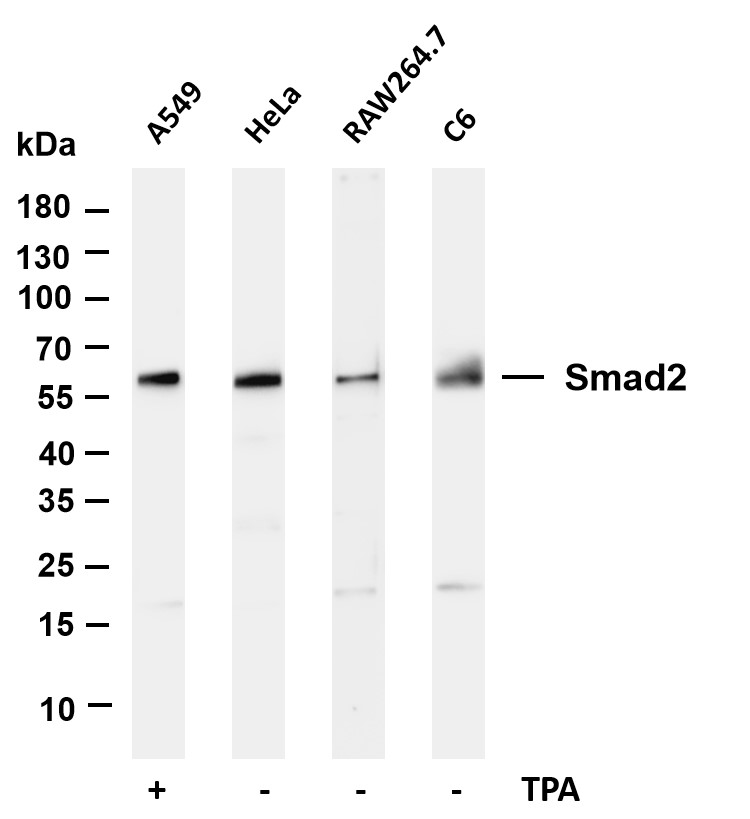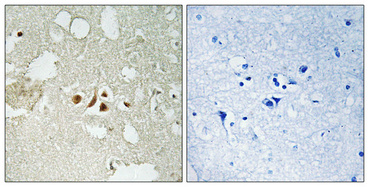Smad2 (PT0111R) PT® Rabbit mAb
- Catalog No.:YM8064
- Applications:WB;IF;IP;ELISA
- Reactivity:Human; Mouse; Rat;
- Target:
- Smad2
- Fields:
- >>Cell cycle;>>Endocytosis;>>Cellular senescence;>>TGF-beta signaling pathway;>>Apelin signaling pathway;>>Hippo signaling pathway;>>Signaling pathways regulating pluripotency of stem cells;>>Th17 cell differentiation;>>Relaxin signaling pathway;>>AGE-RAGE signaling pathway in diabetic complications;>>Chagas disease;>>Human T-cell leukemia virus 1 infection;>>Pathways in cancer;>>Proteoglycans in cancer;>>Colorectal cancer;>>Pancreatic cancer;>>Hepatocellular carcinoma;>>Gastric cancer;>>Inflammatory bowel disease;>>Diabetic cardiomyopathy
- Gene Name:
- SMAD2
- Protein Name:
- Mothers against decapentaplegic homolog 2
- Human Gene Id:
- 4087
- Human Swiss Prot No:
- Q15796
- Mouse Gene Id:
- 17126
- Mouse Swiss Prot No:
- Q62432
- Rat Gene Id:
- 29357
- Rat Swiss Prot No:
- O70436
- Specificity:
- endogenous
- Formulation:
- PBS, 50% glycerol, 0.05% Proclin 300, 0.05%BSA
- Source:
- Monoclonal, rabbit, IgG, Kappa
- Dilution:
- WB 1:1000-1:5000,IF 1:200-1:1000,ELISA 1:5000-1:20000,IP 1:50-1:200,
- Purification:
- Protein A
- Storage Stability:
- -15°C to -25°C/1 year(Do not lower than -25°C)
- Other Name:
- SMAD2;MADH2;MADR2;Mothers against decapentaplegic homolog 2;MAD homolog 2;Mothers against DPP homolog 2;JV18-1;Mad-related protein 2;hMAD-2;SMAD family member 2;SMAD 2;Smad2;hSMAD2
- Molecular Weight(Da):
- 58kD
- Observed Band(KD):
- 58kD
- Background:
- The protein encoded by this gene belongs to the SMAD, a family of proteins similar to the gene products of the Drosophila gene 'mothers against decapentaplegic' (Mad) and the C. elegans gene Sma. SMAD proteins are signal transducers and transcriptional modulators that mediate multiple signaling pathways. This protein mediates the signal of the transforming growth factor (TGF)-beta, and thus regulates multiple cellular processes, such as cell proliferation, apoptosis, and differentiation. This protein is recruited to the TGF-beta receptors through its interaction with the SMAD anchor for receptor activation (SARA) protein. In response to TGF-beta signal, this protein is phosphorylated by the TGF-beta receptors. The phosphorylation induces the dissociation of this protein with SARA and the association with the family member SMAD4. The association with SMAD4 is important for the translocation
- Function:
- disease:Defects in SMAD2 are found in sporadic cases of colorectal carcinoma.,function:Transcriptional modulator activated by TGF-beta and activin type 1 receptor kinase. SMAD2 is a receptor-regulated SMAD (R-SMAD). May act as a tumor suppressor in colorectal carcinoma.,PTM:Acetylated on Lys-19 by coactivators in response to TGF-beta signaling, which increases transcriptional activity. Isoform short: Acetylation increases DNA binding activity in vitro and enhances its association with target promoters in vivo.,PTM:In response to TGF-beta, ubiquitinated by NEDD4L; which promotes its degradation.,PTM:Phosphorylated on one or several of Thr-220, Ser-245, Ser-250, and Ser-255. In response to TGF-beta, phosphorylated on Ser-465/467 by TGF-beta and activin type 1 receptor kinases. Able to interact with SMURF2 when phosphorylated on Ser-465/467, recruiting other proteins, such as SNON, for degr
- Subcellular Location:
- Cytoplasm,Nuclear
- Expression:
- Expressed at high levels in skeletal muscle, endothelial cells, heart and placenta.
Human Novel MicroRNA Seq-915_x4024 in Keratinocytes Contributes to Skin Regeneration by Suppressing Scar Formation. Molecular Therapy-Nucleic Acids Mol Ther-Nucl Acids. 2019 Mar;14:410 WB Human HaCaT cell
Proteomic Profiling of Radiation-Induced Skin Fibrosis in Rats: Targeting the Ubiquitin-Proteasome System. INTERNATIONAL JOURNAL OF RADIATION ONCOLOGY BIOLOGY PHYSICS 2016 Jan 20 WB,IF Human HaCaT cell, WS-1 cell
Positive feedback loop of YB-1 interacting with Smad2 promotes liver fibrosis. BIOCHEMICAL AND BIOPHYSICAL RESEARCH COMMUNICATIONS Biochem Bioph Res Co. 2017 Mar;484:753 CoIP Human LX-2 cell,293T cell
Song, Jianyuan, et al. "The Role of FABP5 in Radiation-Induced Human Skin Fibrosis." Radiation research 189.2 (2017): 177-186.
Wang, Wenjie, et al. "Proteomic profiling of radiation-induced skin fibrosis in rats: Targeting the ubiquitin-proteasome system." International Journal of Radiation Oncology* Biology* Physics 95.2 (2016): 751-760.
Shao, Min, et al. "Exogenous angiotensin (1-7) directly inhibits epithelial-mesenchymal transformation induced by transforming growth factor-β1 in alveolar epithelial cells." Biomedicine & Pharmacotherapy 117 (2019): 109193.
- June 19-2018
- WESTERN IMMUNOBLOTTING PROTOCOL
- June 19-2018
- IMMUNOHISTOCHEMISTRY-PARAFFIN PROTOCOL
- June 19-2018
- IMMUNOFLUORESCENCE PROTOCOL
- September 08-2020
- FLOW-CYTOMEYRT-PROTOCOL
- May 20-2022
- Cell-Based ELISA│解您多样本WB检测之困扰
- July 13-2018
- CELL-BASED-ELISA-PROTOCOL-FOR-ACETYL-PROTEIN
- July 13-2018
- CELL-BASED-ELISA-PROTOCOL-FOR-PHOSPHO-PROTEIN
- July 13-2018
- Antibody-FAQs
- Products Images

- Various whole cell lysates were separated by 4-20% SDS-PAGE, and the membrane was blotted with anti-Smad2 (PT0111R) antibody. The HRP-conjugated Goat anti-Rabbit IgG(H + L) antibody was used to detect the antibody. Lane 1:A549 treated with TPA of 48 hours Lane 2: Hela Lane 3: RAW264.7 Lane 4: C6 Predicted band size: 58kDa Observed band size: 58kDa

